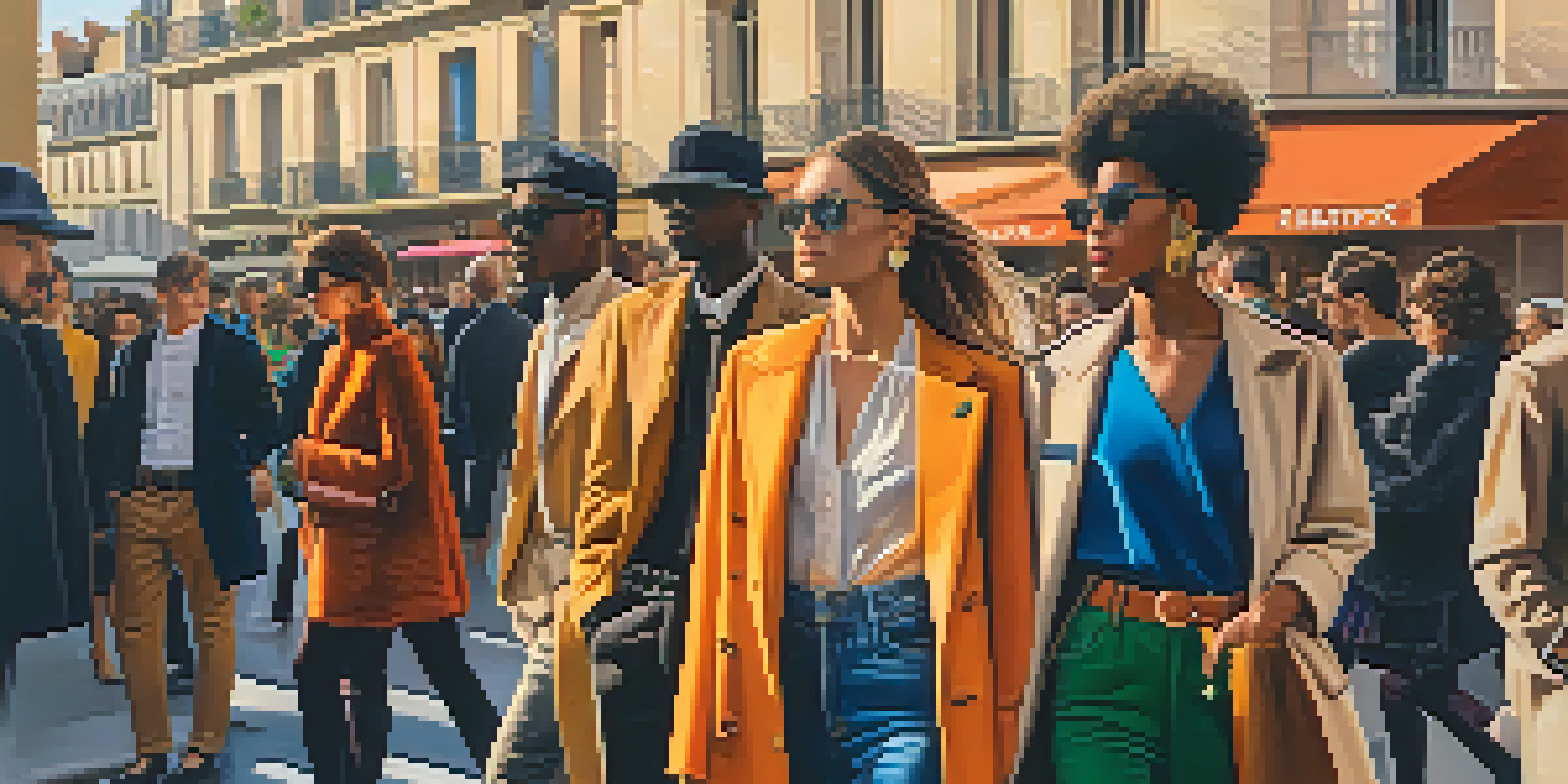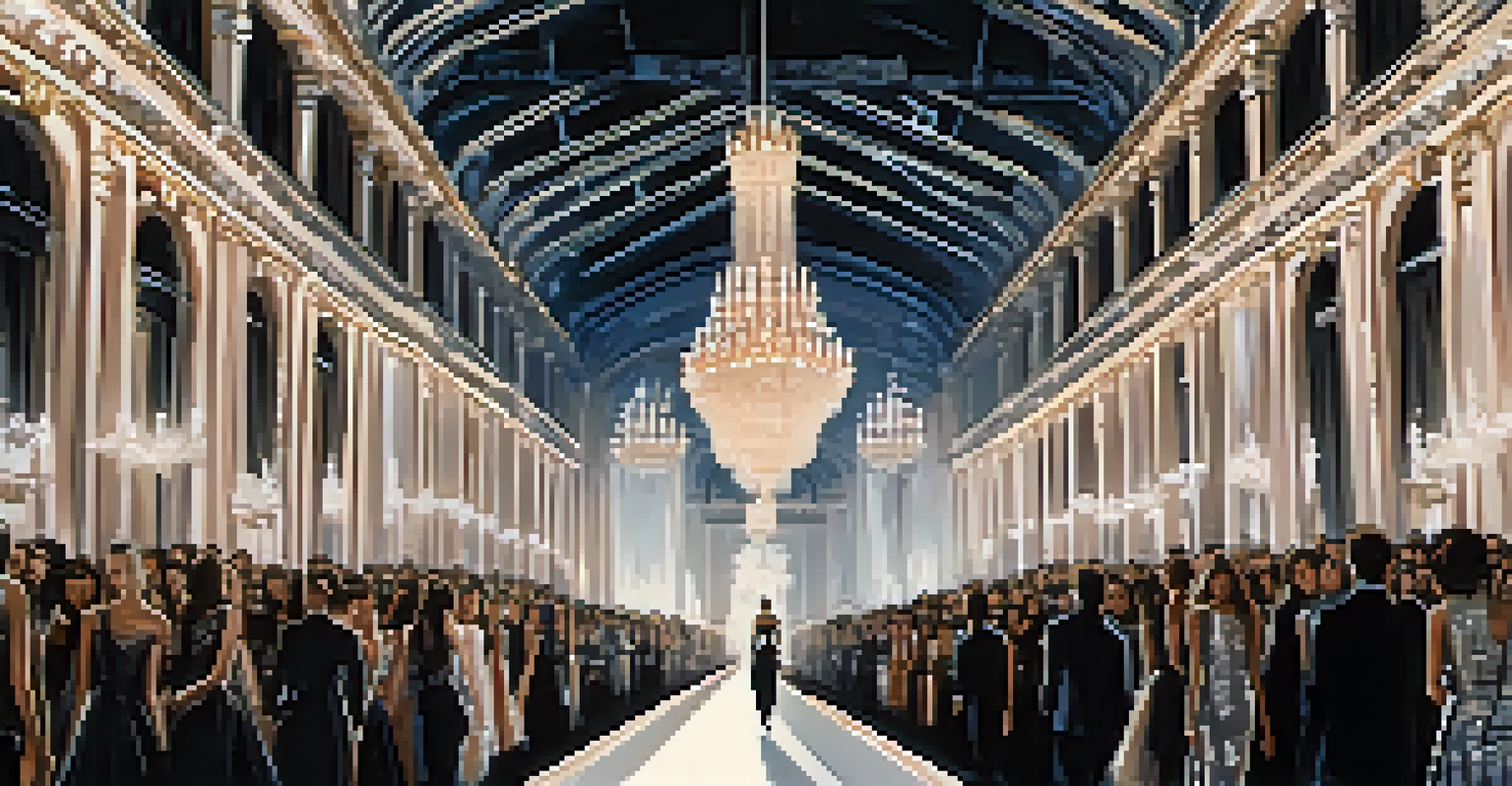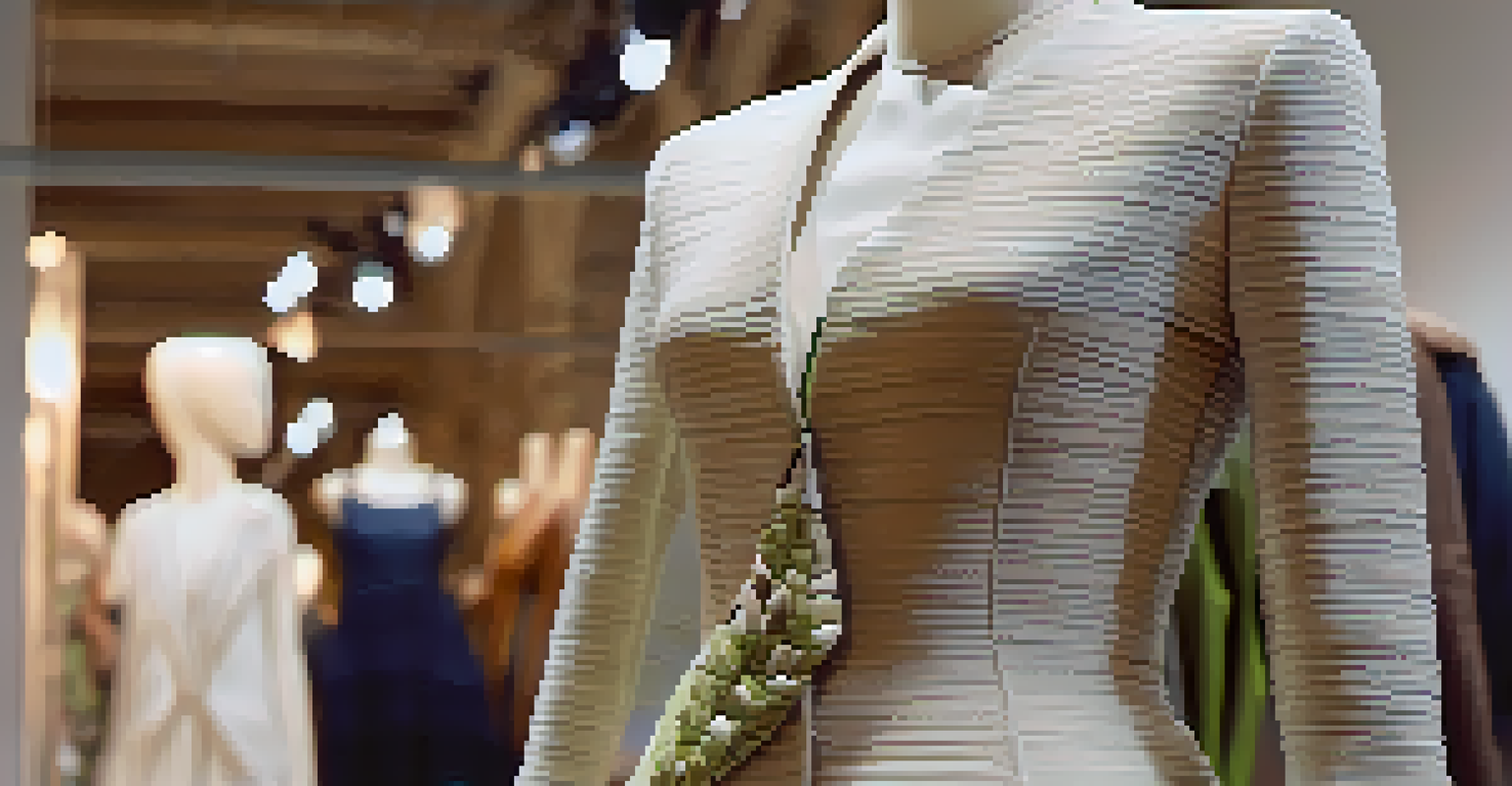Paris Fashion Week: The Epicenter of Haute Couture Trends

The Legacy of Paris Fashion Week: A Historical Overview
Paris Fashion Week has a rich history, dating back to the 1940s when it first emerged as a platform for showcasing the latest haute couture collections. Designers like Christian Dior and Coco Chanel set the stage for what would become a global phenomenon. This event quickly evolved into a must-attend for fashion enthusiasts and industry insiders alike, solidifying Paris's reputation as the fashion capital.
Fashion is the armor to survive the reality of everyday life.
Over the decades, the event has witnessed the rise of iconic designers and fashion houses, each leaving their mark on the industry. From the extravagant creations of Jean Paul Gaultier to the minimalist elegance of Phoebe Philo, Paris Fashion Week has continually pushed the boundaries of creativity. It serves as a timeline of trends, showcasing how fashion reflects society's evolving tastes and values.
Today, Paris Fashion Week remains a beacon of innovation, attracting talent from all corners of the globe. With its blend of established names and emerging designers, the event captures the essence of contemporary fashion. It’s not just about clothes; it's a celebration of artistry, culture, and the shared passion for style.
The Major Players: Designers Who Define the Trends
At the heart of Paris Fashion Week are the visionary designers who set the tone for the season. Powerhouses like Louis Vuitton, Givenchy, and Chanel unveil their collections with much anticipation, often showcasing designs that inspire trends worldwide. Each season, these brands bring a unique perspective, blending tradition with modernity to create unforgettable pieces.

Emerging designers also play a crucial role, often challenging the status quo and offering fresh perspectives. Brands like Jacquemus and Marine Serre have captured the spotlight with their innovative designs and sustainable practices. Their presence at Paris Fashion Week highlights the shifting dynamics in fashion, where new voices are celebrated alongside established ones.
Paris Fashion Week's Rich Legacy
Since the 1940s, Paris Fashion Week has evolved into a global showcase for creativity and style, highlighting the evolution of fashion through iconic designers.
The collaborative spirit of Paris Fashion Week fosters an environment where creativity can thrive. Designers not only showcase their individual collections but also influence each other, resulting in a rich tapestry of styles that shape the fashion landscape. This interconnectedness is vital, as it allows for the cross-pollination of ideas and the emergence of new trends.
The Role of Fashion Shows: More Than Just a Runway
Fashion shows at Paris Fashion Week are not merely about displaying clothing; they are immersive experiences that tell a story. Designers carefully curate every element, from music to lighting, creating an atmosphere that resonates with their vision. These productions often blur the lines between fashion and art, leaving audiences captivated.
Sustainability is not a trend. It is the future of fashion.
For instance, the theatrical presentations by designers like Alexander McQueen or Dior have become legendary, transforming the runway into a stage for storytelling. Each show invites viewers to explore a narrative that reflects the designer's inspirations, often provoking thought and emotion. This artistic approach elevates the fashion show beyond mere commerce, making it a cultural event.
Moreover, these shows serve as a platform for brands to connect with consumers and the media, generating buzz and anticipation. The impact of a well-executed show can extend far beyond the runway, influencing trends and consumer behavior long after the event concludes. This is why Paris Fashion Week is a pivotal moment in the fashion calendar, setting the stage for what’s to come.
Sustainable Fashion: A Growing Trend at Paris Fashion Week
As the fashion industry grapples with its environmental impact, sustainability has taken center stage at Paris Fashion Week. Many designers are now prioritizing eco-friendly practices, from sourcing materials to production methods. This shift not only responds to consumer demand but also reflects a broader commitment to preserving the planet for future generations.
Brands like Stella McCartney have long championed sustainable fashion, showcasing collections that are both stylish and environmentally conscious. Their innovative use of materials, such as recycled fabrics and vegan leather, demonstrates that sustainability and luxury can coexist. This trend is gaining momentum, with more designers incorporating eco-friendly practices into their business models.
Sustainability Takes Center Stage
With increasing focus on eco-friendly practices, many designers at Paris Fashion Week are blending luxury with sustainability to meet consumer demand.
The emphasis on sustainability also extends to the production process, with many brands focusing on transparency and ethical labor practices. This conscientious approach resonates with today’s consumers, who are increasingly seeking out brands that align with their values. Paris Fashion Week serves as a platform to highlight these efforts, inspiring others in the industry to follow suit.
Influence of Technology: The Digital Transformation of Fashion
Technology has dramatically reshaped Paris Fashion Week, ushering in a new era of digital innovation. From live-streaming shows to virtual reality experiences, designers are leveraging technology to reach a broader audience. This shift has made Paris Fashion Week more accessible, allowing fashion enthusiasts worldwide to engage with the latest trends.
The rise of social media has also transformed how fashion is consumed and discussed. Influencers and fashion bloggers play a pivotal role in shaping public perception, often providing real-time coverage of the event. This instant access to collections fosters a sense of community, as fans eagerly share their thoughts and favorite looks with the world.
Moreover, brands are exploring innovative ways to incorporate technology into their designs. From 3D printing to smart textiles, the fusion of fashion and technology is creating exciting possibilities. This evolution not only enhances the consumer experience but also pushes the boundaries of what fashion can be, making Paris Fashion Week a hotbed of creativity and experimentation.
Street Style: The Pulse of Paris Fashion Week
While the runway is undoubtedly the highlight of Paris Fashion Week, the street style surrounding the event is equally captivating. Fashion enthusiasts, influencers, and photographers flock to the streets, showcasing their unique styles and interpretations of current trends. This vibrant display of personal expression adds another layer of excitement to the event.
Street style often reflects the zeitgeist of the fashion world, capturing the essence of what people are wearing outside the shows. It serves as a source of inspiration for designers, who may draw from these real-world looks when creating their collections. The interplay between runway trends and street style is a testament to the dynamic nature of fashion.
Technology Transforms Fashion Events
The digital transformation of Paris Fashion Week, through live-streaming and social media, has made fashion more accessible and interactive for global audiences.
Additionally, street style coverage on social media platforms amplifies this phenomenon, allowing trends to spread rapidly. Fashion lovers eagerly share their outfits and experiences, creating a sense of community and conversation. Paris Fashion Week thus becomes not just an event for industry insiders but a celebration of global fashion culture.
The Future of Fashion: What Lies Ahead After Paris Fashion Week
As Paris Fashion Week wraps up, the question on everyone’s mind is: what’s next? The trends unveiled during the event often set the tone for the upcoming season, influencing everything from retail to consumer behavior. Designers and brands leave a lasting impact, shaping the fashion landscape for months to come.
However, the future of fashion is not without its challenges. Issues such as sustainability and inclusivity are at the forefront of industry discussions, pushing brands to evolve and adapt. Consumers are increasingly demanding transparency and ethical practices, prompting designers to rethink their approaches and priorities.

Ultimately, Paris Fashion Week serves as both a reflection of the current state of fashion and a glimpse into its future. The creativity and innovation displayed during the event inspire a new generation of designers, ensuring that the fashion world remains vibrant and ever-evolving. As we look ahead, one thing is certain: the heartbeat of haute couture will continue to pulse strong.